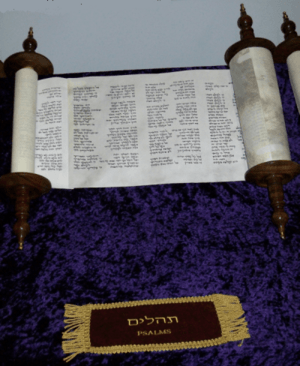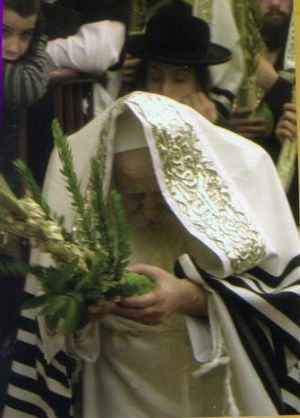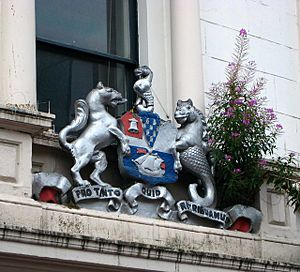Psalm 116 facts for kids
Quick facts for kids Psalm 116 |
|
|---|---|
| "I love the LORD, because he hath heard my voice" | |
| Egyptian Hallel psalm | |

Scroll of the Psalms
|
|
| Other name |
|
| Language | Hebrew (original) |
| Psalm 116 | |
|---|---|
| Book | Book of Psalms |
| Hebrew Bible part | Ketuvim |
| Order in the Hebrew part | 1 |
| Category | Sifrei Emet |
| Christian Bible part | Old Testament |
| Order in the Christian part | 19 |
Psalm 116 is a special song or poem found in the Book of Psalms in the Bible. It's the 116th psalm in the collection. It starts with the words, "I love the LORD, because he hath heard my voice and my supplications" in the King James Version. This psalm is part of a group called the Egyptian Hallel, which are psalms of praise.
In some older versions of the Bible, like the Greek Septuagint and the Latin Vulgate, Psalm 116 is split differently. It might be combined with Psalm 114 and Psalm 115. For example, Psalm 114 is known as "Dilexi quoniam exaudiet Dominus" in Latin. Psalm 116 is the fourth psalm in the "Egyptian Hallel" group.
Psalm 116 is used in many religious services today. It is a regular part of Jewish, Catholic, Lutheran, Anglican, and other Christian worship. Many famous musicians have also created songs based on this psalm.
Contents
What Language Is Psalm 116 In?
The original Psalm 116 was written in Hebrew and does not have a special title. It was later translated into Greek around 250 BC for the Septuagint Bible. This translation happened in ancient Egypt.
Some experts think the psalm might have been written later than other psalms. This is because it uses some words that come from Aramaic, another old language. However, this is not a definite answer. The psalm also uses ideas and phrases from other psalms, almost like it's a summary of them.
The Words of Psalm 116
This psalm is a heartfelt prayer of thanks. It shows someone who was in great trouble but was saved by God. The speaker promises to thank God publicly for His kindness.
King James Version
- I love the LORD, because he hath heard my voice and my supplications.
- Because he hath inclined his ear unto me, therefore will I call upon him as long as I live.
- The sorrows of death compassed me, and the pains of hell gat hold upon me: I found trouble and sorrow.
- Then called I upon the name of the LORD; O LORD, I beseech thee, deliver my soul.
- Gracious is the LORD, and righteous; yea, our God is merciful.
- The LORD preserveth the simple: I was brought low, and he helped me.
- Return unto thy rest, O my soul; for the LORD hath dealt bountifully with thee.
- For thou hast delivered my soul from death, mine eyes from tears, and my feet from falling.
- I will walk before the LORD in the land of the living.
- I believed, therefore have I spoken: I was greatly afflicted:
- I said in my haste, All men are liars.
- What shall I render unto the LORD for all his benefits toward me?
- I will take the cup of salvation, and call upon the name of the LORD.
- I will pay my vows unto the LORD now in the presence of all his people.
- Precious in the sight of the LORD is the death of his saints.
- O LORD, truly I am thy servant; I am thy servant, and the son of thine handmaid: thou hast loosed my bonds.
- I will offer to thee the sacrifice of thanksgiving, and will call upon the name of the LORD.
- I will pay my vows unto the LORD now in the presence of all his people.
- In the courts of the LORD's house, in the midst of thee, O Jerusalem. Praise ye the LORD.
Main Ideas of Psalm 116
The main idea of Psalm 116 is to praise God. It encourages everyone to thank God for His goodness. The psalm talks about how God has helped people in the past and how His faithfulness will last forever. It seems to bring together the main messages of other psalms of praise, especially those from Psalm 107 onwards.
Who Wrote Psalm 116?
People have different ideas about who wrote Psalm 116.
- Some, like Theodoret in the 400s AD, thought it was about the troubles of the Jews during the time of the Maccabees. This was when they faced a harsh ruler named Antiochus Epiphanes.
- A few people think it was written by Hezekiah when he was sick, as described in the Book of Isaiah.
- However, most experts today believe that King David wrote it. If David was the author, it might have been written after a specific event where God saved him, or simply as a general thank you for all the times God had helped him.
- The Syriac Church believes it was written when Saul found David hiding in a cave.
How Psalm 116 Is Used
Psalm 116 is an important part of worship for many different faiths.
In Judaism

- This psalm is one of six psalms (113-118) that make up the Hallel. The word hallel means "praise."
- On days when Hallel is recited, this psalm is usually said completely. However, on certain days like Rosh Chodesh (new moon) and the last six days of Passover, only verses 1-11 are recited.
- The "Egyptian Hallel" has been used in Passover celebrations for a very long time.
- Verse 13 is also part of Havdalah, a Jewish ceremony that marks the end of the Sabbath.
In Christianity
- In the New Testament, Paul the Apostle quoted verse 10 of Psalm 116 in his letter 2 Corinthians (chapter 4, verse 13).
- The Syriac Christian church uses this psalm to welcome new people joining the church.
- In Catholicism, Pope John Paul II used this psalm as a public prayer. He called it a "Prayer of thanksgiving to the Lord."
- For Protestants, many see Psalm 116 as a psalm of thanksgiving. Some, like Charles Spurgeon, even saw it as a psalm spoken by Jesus Christ Himself.
- On February 3, 1788, Reverend Richard Johnson, an Anglican minister, gave the first Christian church service in Australia. He preached to convicts of the First Fleet, and his sermon was based on Psalm 116:12-14.
City Motto
The city of Belfast, in Northern Ireland, has a motto that comes from Psalm 116:12. The motto is Pro Tanto Quid Retribuamus, which means "What shall we give in return for so much?" or "What shall I return to the Lord for all his kindness to me?"
Important Verses
Some verses in Psalm 116 are especially well-known or have been discussed a lot.
Verse 11: "All Men Are Liars"
Verse 11 says, "I said in my haste, All men are liars." This line can be understood in different ways.
- Some people see it as an early example of a "liar paradox," which is a tricky statement that seems to contradict itself.
- Other translations say "I said in my fear, Every man is a liar."
- The word used in Hebrew can mean "haste" or "flight" (running away) rather than "fear." So, it might mean the speaker said this in a moment of panic or despair.
The Cup of Salvation
Verse 13 says, "I will take the cup of salvation, and call upon the name of the LORD."
- For Catholics, this phrase is sometimes seen as a hint about the Eucharist, which is a holy meal in their church.
- Some people think it's similar to a Jewish ceremony today that remembers how their ancestors were saved from slavery in Egypt.
- Others believe it refers to a drink offering that was given in Solomon's Temple in ancient times. This would mean the writer is offering thanks for being saved.
- It's also thought that this verse might have inspired Jesus at the Last Supper or Paul's "cup of blessing" mentioned in the Bible.
Musical Works Inspired by Psalm 116
Many composers have been inspired by Psalm 116 and set its words to music.
- A collection called Angst der Hellen und Friede der Seelen (meaning "Fear of Hell and Peace of the Soul") from 1623 includes sixteen musical settings of Psalm 116 in German. Famous composers like Heinrich Schütz and Michael Praetorius contributed to this collection.
- Marc-Antoine Charpentier created a setting of Psalm 115 (which is part of Psalm 116 in the Vulgate numbering) in 1690.
- Anton Bruckner composed a setting of the first nine verses of Psalm 116 in 1852.
- Franz Schreker also composed a setting of Psalm 116 for a women's choir and orchestra in 1900.
Images for kids




